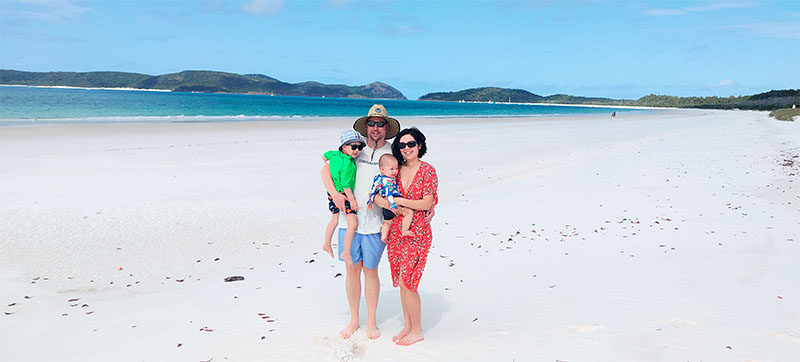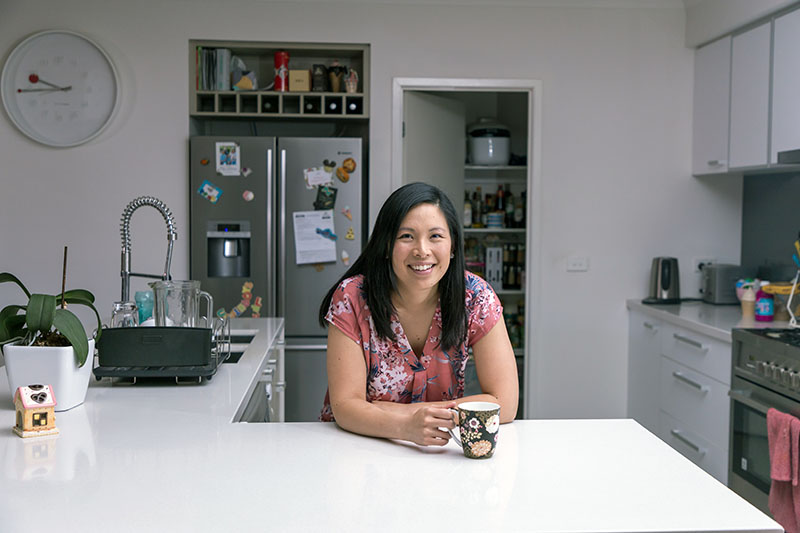2022 UNE Rising Star Award winner - Ms Jolynne Rydz
In recognition of her leadership and inspiring approach to improving workplace relations and professional development.
There was a time, not that long ago, when leadership coach and organisational development specialist Jolynne Rydz was too afraid to ask a question in a work meeting. “I would spend the whole time analysing whether I should even raise my hand,” she says. “There were a lot of things I wouldn’t dream of trying because I was too afraid to fail. Perfectionism held me back.”
Taking up a friend’s suggestion to do a “failure experiment” – setting herself a challenge so demanding that it was likely to defeat her – helped. And that was when Jolynne met her match with a multi-layered black forest cake.
“On MasterChef [the televised cooking competition], contestants were given three hours to make this really complex cake,” she says. “It took me eight, and my cake was a bit hard and a bit dry, but I discovered that it wasn’t the end of the world. It was a powerful lesson for me to give things a go. Now, I know that’s when I learn the most.”
Jolynne’s colleague at the City of Whittlesea in Victoria, Andrea Whitelaw, says Jolynne’s evolution from “a guarded … and not particularly brave” individual to someone perfectly comfortable outside their comfort zone is now complete. And the steep trajectory of the 2022 Rising Star coincided with the completion of her Masters in Strategic Organisational Development with UNE.
“Many people study, but it’s not often I see someone bloom so significantly because they took massive action in applying their learnings,” says Andrea, the Unit Manager of Organisational Development. This has benefitted Jolynne, her team and the city’s 1,000-plus workforce, which has shown gratitude for “her fearless approach and … awe for her coaching skills”.
“Jolynne fights for what is right – whether that’s people having a voice (regardless of hierarchy), people from all walks of life feeling seen, shining a light on aspects of our workplace that aren’t fair or reasonable … and regularly points out a differing point of view in group discussions,” Andrea says.
Recently, Jolynne presented to a crowd of 100 at a women’s leadership forum and earned high praise for her grace and presence. At Whittlesea, where she has led the design and implementation of leadership programs for several years, her passion and talent for developing others is similarly valued.
Through her leadership of City of Whittlesea’s signature Emerging Leaders Program, Jolynne’s support for greater representation of people from marginalised groups (including Aboriginal and Torres Strait Islander, LGBTIQ+, people with disabilities, women, and people from culturally diverse backgrounds) is helping to enhance the organisation’s moves towards greater diversity and inclusion. Openly sharing some of her own experiences has helped to build rapport, engagement and awareness.
Through my studies I have learnt the power of authenticity and vulnerability to connect with people
“Through my studies I have learnt the power of authenticity and vulnerability to connect with people,” Jolynne says. “It removes that power differential that can sometimes come with titles; it allows you to sit, person-to-person. Humans by nature want to grow. As an organisational development consultant, it’s my role to make work a great place to be, so people in the organisation can flourish.”
A more diverse leadership team, Jolynne believes, produces better organisational outcomes. “It opens you to different ways of thinking and lived experiences, and it better prepares you for future challenges,” she says. “But this is something you have to truly believe in. It’s easy to keep things comfortable and fall into biases that reinforce your own world view. Research shows that we frequently recruit people that are like us and who we’re going to get along with, but then you don’t have good debates, where people challenge you to innovate and do things better.”
Challenging the status quo is something that Jolynne is now perfectly okay with, especially since becoming a parent and experiencing its career impacts. She is a vocal advocate for eliminating the concept of a primary carer in paid parental leave provisions, arguing that it commonly sees women sacrifice their careers due to biological reasons, whilst also inhibiting the crucial bond between the secondary parent and their baby.

Jolynne with her family
“The secondary parent, generally a man, returns to work and has minimal career disruption, whereas the woman will have a career break of six months if not 1-2 years as they have one child and possibly more,” Jolynne says. “This disruption, the return to part-time work and often in a lower-paying position, disadvantages mothers. Fathers also miss out on so much time with their child.
The common policy makes an assumption that bringing up a child takes just one person
“The common policy makes an assumption that bringing up a child takes just one person. Imagine, where there are two parents in the family, if both could be there during that crucial time when you are sleep-deprived and on call to feed this little human, help them grow and find their place in the world. I believe a lot of society’s challenges can be solved if parents are supported to thrive, instead of just get by on the bare minimum.”
Her own experiences of the isolation, confusion and loss of identity and worth that can accompany parenting has also led Jolynne to launch leadership courses and coaching for parents. Under the Whole Parent Method, she applies her knowledge of leadership to the family context, seeking to foster “thriving families and gender equity by equipping parents to be confident, resilient and empowered”.
“Up to 10% of men and 22% of women experience perinatal depression and/or anxiety, with maternal suicide being the leading cause of maternal death in Australia,” Jolynne says. “When you have a child, you get a lot of advice; it’s either conflicting, unwanted or sometimes condescending, and this all creates a tremendous amount of stress. The focus is primarily on the baby, and parents receive little support through this major life transition.
“I want to help educate them about the key challenges they will face and provide some key coping tools. Many of the leadership skills we learn in the workplace are transferable to parenting. I’m far from the perfect parent but I think there is a lot we can learn to help the process be less stressful and more fun. When we as parents thrive, our kids will, too.”


